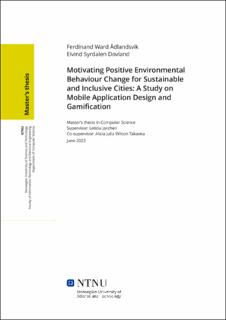| dc.contributor.advisor | Jaccheri, Letizia | |
| dc.contributor.advisor | Takaoka, Alicia Julia Wilson | |
| dc.contributor.author | Ådlandsvik, Ferdinand Ward | |
| dc.contributor.author | Dovland, Eivind Syrdalen | |
| dc.date.accessioned | 2023-09-28T17:25:07Z | |
| dc.date.available | 2023-09-28T17:25:07Z | |
| dc.date.issued | 2023 | |
| dc.identifier | no.ntnu:inspera:142737689:34430267 | |
| dc.identifier.uri | https://hdl.handle.net/11250/3092872 | |
| dc.description.abstract | Klimaendringer utgjør en global trussel som krever øyeblikkelig handling. EUs
grønne vekststrategi - "European Green Deal", har som mål å oppnå netto nul-
lutslipp av klimagasser innen 2050, med inkludering som en prioritet. Initiativer
som New European Bauhaus og EU Cities Mission legger vekt på bærekraftige og
estetisk tiltalende byløsninger. Smarte byer, som er drevet av avansert teknologi,
gir lovende muligheter, og utvikling av inkluderende digitale løsninger er viktig
for å oppnå disse målene.
I dette prosjektet undersøker vi hvordan man bør designe en digital plattform
som kan motivere innbyggere til positiv endring av miljøatferd og bidra til en
bærekraftig og inkluderende by. Vi undersøker også bruken av spillifisering for
å motivere til endring av miljøatferd. Målene for prosjektet ble etablert basert
på funnene fra et systematisk litteraturstudie gjennomført høsten 2022. Følgende
forskningsspørsmål ble formulert, og veileder forskningsprosjektet:
FS1: Hvordan bør en digital plattform utformes for å motivere innbyggere til
å bidra til en bærekraftig og inkluderende by?
FS2: Hvilke spesifikke spilldesign-elementer bør implementeres i en slik digital
plattform for å få innbyggere til å endre miljøatferd?
For å svare på forskningsspørsmålene har vi utviklet en prototype på en mobil-
applikasjon, i tråd med forskningsstrategien "Design and creation". Vi har benyttet
oss av et fokusgruppeintervju, brukervennlighetstesting, observasjon og et spør-
reskjema, kalt SUS, som datainnsamlingsmetoder i prosjektet.
Fokusgruppeintervjuet og brukervennlighetstestingen ga viktig innsikt for vår
mobilapplikasjonsprototype. Motivasjonsaspekter, inkludert sosiale aspekter og
konkurranseelementer, veiledet kravene til applikasjonen. Resultatene fra bruker-
vennlighetstestingen, med SUS-poengsum på henholdsvis 80,7 og 86,1 for Iter-
asjon 1 og Iterasjon 2, bekreftet effektiviteten av designet og viste virkningen av
forskjellige spilldesign-elementer på brukernes motivasjon.
Oppgaven konkluderer med at spilldesign-elementer, som utfordringer, emble-
mer, poeng og topplister, effektivt motiverer innbyggere til å endre sin miljøatferd.
Ved å tilpasse designet til individuelle preferanser, sosiale aspekter og fremme
inkludering, kan den digitale plattformen ha betydelig innvirkning på atferdsendring.
Denne studien gir verdifulle innsikter for utforming av effektive digitale platt-
former for bærekraftige og inkluderende byer. | |
| dc.description.abstract | Urgent action is needed to address the global threat of climate change. The European
Green Deal aims for net zero greenhouse gas emissions by 2050, with inclusion as
a priority. Sustainable, visually appealing urban solutions are emphasized by the
New European Bauhaus initiative and the European Union (EU) Cities Mission.
Smart cities, driven by advanced technology, offer promising solutions, and inclus-
ive digital solutions should be developed and studied to contribute to achieving
these goals.
In this project, we aim to explore how a digital platform should be designed to
motivate citizens towards positive environmental behaviour change for a sustain-
able and inclusive city. We also investigate the use of gamification to encourage
environmental behaviour change. The research objective was established based on
the findings of a Systematic Literature Review (SLR) conducted in the autumn of
2022. The following research questions were formulated, which guide the study:
RQ1: How should a digital platform be designed to motivate citizens to con-
tribute to a sustainable and inclusive city?
RQ2: Which specific gamification elements should be implemented in such a
digital platform to make citizens change environmental behaviour?
To answer the RQs, a mobile application prototype has been developed, fol-
lowing the design and creation research strategy. The data generation methods
used as part of the research project were a focus group interview, usability test-
ing, observation, and a questionnaire, namely the System Usability Scale (SUS).
The focus group interview and usability testing yielded key insights for our mo-
bile application prototype. Motivational aspects, including network features and
competition, guided the application’s requirements. Usability testing results, with
SUS scores of 80.7 and 86.1 for Iteration 1 and Iteration 2 respectively, confirmed
the effectiveness of the design and highlighted the impact of different gamification
elements on user motivation.
The thesis concludes that gamification elements, such as challenges, badges,
points, and leaderboards, effectively motivate citizens to change their environ-
mental behaviour. By tailoring the design to individual preferences, social as-
pects, and promoting inclusivity, the digital platform can have a significant im-
pact on motivation and behaviour change. This study provides valuable insights
for designing effective digital platforms for sustainable and inclusive cities. | |
| dc.language | eng | |
| dc.publisher | NTNU | |
| dc.title | Motivating Positive Environmental Behaviour Change for Sustainable and Inclusive Cities: A Study on Mobile Application Design and Gamification | |
| dc.type | Master thesis | |
